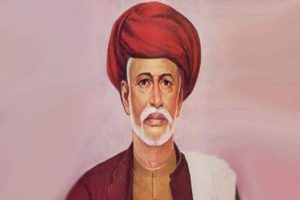Jyotirao Phule:

He was born on April 11, 1827, and his birth anniversary is celebrated as Jyotiba Phule Jayanti every year.
- Born in 1827 in Satara district of Maharashtra.
- Phule was given the title of Mahatma on May 11, 1888, by Vithalrao Krishnaji Vandekar, a Maharashtrian social activist.
Social reforms and key contributions:
- His work is related mainly to the eradication of untouchability and caste system, emancipation and empowerment of women, reform of Hindu family life.
- Along with his wife, Savitribai Phule, he is regarded as pioneer of women’s education in India.
- The couples were the first native Indians to open the first indigenously-run school for girls in India in August 1848 at Pune in Maharashtra.
- Later, the Phules started schools for children from the then untouchable castes such as Mahar and Mang.
- In 1863, he opened a home for pregnant Brahmin widows to give birth in a safe and secure place.
- He opened an orphanage home to avoid infanticide. In this regard, he is believed to be the first Hindu to start an orphanage for unfortunate children.
- In 1868, Jyotirao decided to construct a common bathing tank outside his house to exhibit his embracing attitude towards all human beings and wished to dine with everyone, regardless of their caste.
- In 1873, Phule founded the Satyashodhak Samaj, or the Society of Seekers of Truth, for the rights of depressed classes, to denounce the caste system, and to spread rational thinking.
- His famous works: Tritiya Ratna (1855), Gulamgiri (1873), Shetkarayacha Aasud, or Cultivator’s Whipcord (1881), Satyashodhak Samajokt Mangalashtakasah Sarva Puja-vidhi (1887).




